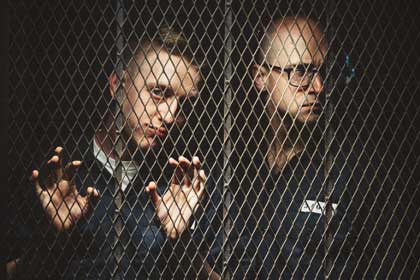Play (1998)
by Bruce Graham
Directed by Daniel Bourque
Hub Theatre Company of Boston
First Church In Boston
March 31 – April 15, 2017
With Cameron Gosselin (Bobby Reyburn), Mark Krawczyk (John Brennan), Regina Vital (Shawn DuChamps), Robert Orzalli (Sam Fried)

Mark Krawczyk as John Brennan
in “Coyote On A Fence”
Photo: Courtesy of Hub Theatre Company of Boston
Locked in adjacent cells, John (Mark Krawzyk) and Bobby (Cameron Gosselin) await their fates.
Bobby, a 28 year old white supremacist, has committed a mass murder of black people gathered in a church. Remarkably, he seems calm in the face of his impending death sentence, assured that his next stop is heaven.
John, who edits a popular prison paper, is less straightforward about the crime that put him on death row. Intelligent in many ways, and literate, John constantly appeals his sentence, hopeful that the process will forestall his execution indefinitely. He encourages Bobby to appeal his sentence as well, but Bobby refuses, arguing that straightforwardly acknowledging his action is preferable, assured as he is that he has a place in the eternal world above.
A New York Times reporter, Sam Fried (Robert Orzalli), pursues John, curious about the humanizing stories that appear in the prison paper that John edits. A good researcher, Sam also is able to confront John about his own past in a way that forces John to come to terms with it.
The prison guard, Shawn (Regina Vital), provides chatty interludes that take place both on the death-row cell block where she works and at a local bar where she takes refuge from her trying work.
As a whole, the play, written almost twenty years ago, might be seen as an indictment of capital punishment, At the same time, the play does not blink at the horrors which Bobby has committed or the completely unrepentant way he regards his actions.
The character of John is considerably more complex and problematic. In many ways humane, capable and refined, John also hides a dark past. He seems redeemable in a way that Bobby seems not to be, yet he remains a condemned man.
Bobby gives a vivid account of his past, and though one regards his actions and attitudes as deplorable, one cannot help recognizing that the events of childhood which he recounts could easily drive one to a criminal madness. Ironically, though Bobby willingly accepts his execution, his recounting of his childhood makes one think how much of a psychological and emotional victim he is as well.
The drama centers mostly around John’s unwillingness to acknowledge the crime for which he has been sentenced. The interaction between Bobby, who is completely willing to acknowledge and describe his crime, and John, who cringes at the thought of acknowledging his at all, frames the question of self-deception in various ways. Bobby blinds himself to his crime by asserting his beliefs against blacks and Jews and reaffirming his faith in going to heaven. John hovers on the edge of not acknowledging his own crime at all. How those two forms of self-delusion present themselves and interact provides the meat of the play. It’s not entirely clear why John has such a difficult time acknowledging his crime – we’re not given enough background to really understand that – so the main drama floats a bit on presumptions.
All the acting is very good, but, in particular, Cameron Gosselin hands in a riveting performance as Bobby. His character is at once awful and accessible, just as it should be. That presentation of this dastardly character with a considerable degree of empathy makes the drama complex and interesting, and certainly, metaphorically, spurs one on to think more carefully about the finalities of capital punishment.
– BADMan
Leave a Reply